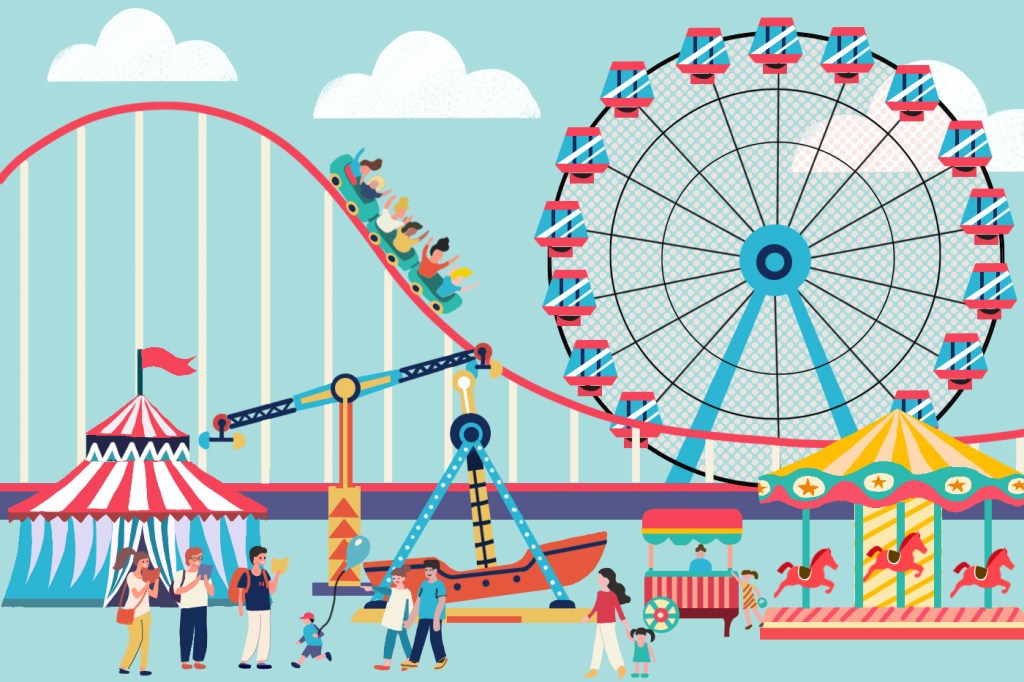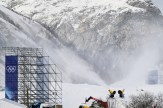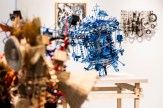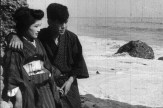Roller coasters, creativity and competition: Northeastern’s Theme Park Engineering Club rides high on innovation
The club places an emphasis on the theme in theme park engineering, recognizing that parks are composed of more than just roller coasters.

Between them, Northeastern University mechanical engineering students Ariana Pertuz and Reyna Rodriguez have been on plenty of roller coaster rides, but they are in agreement on their favorite — Jurassic World VelociCoaster at Universal Studios in Orlando, Florida.
Located in the Islands of Adventure, this launch coaster is powered by linear synchronous motors and uses electromagnets to propel riders at speeds of up to 70 mph. The coaster features two launches, four inversions — during which riders are turned upside down — and a top hat of 155 feet.
“I remember getting off of it, and I could tell that ride changed every other ride for me afterwards. There’s no other ride that compares,” Rodriguez says.
“It really is an amazing ride,” Pertuz adds.
As leaders of Northeastern’s Theme Park Engineering Club — Pertuz is president and Rodriguez vice president — the fourth-year students have aspirations to one day design that kind of coaster themselves.
At their weekly Wednesday night meetings at the EXP research complex on the Boston campus, Pertuz and Rodriguez share in that enthusiasm with the 2-year-old club’s growing membership of theme park devotees.
The club places a big emphasis on the theme in theme park engineering, recognizing that parks are composed of more than just roller coasters. The best theme parks, the members agree, immerse attendees into an experience — think about the snow-covered roofs in the village of Hogsmead at the Wizarding World of Harry Potter at Universal Studios or the dusty Droid Depot shop at Star Wars Galaxy’s Edge at Disney’s Hollywood Studios.
“The purpose of the club is to provide opportunities and resources for students who are interested in the themed-entertainment field,” Pertuz says. “Whether it’s through learning from professionals or just getting experience.”
Over the past few months, club members have been working on a number of small projects with that in mind.
Earlier this semester, they created their own Husky Bands inspired by the Disney MagicBands guests wear at Disney World and DisneyLand to enter the parks, unlock their hotel room at Disney resorts and purchase items.
The bands use radio frequency identification (RFID) technology and serve as a good exercise in highlighting just how deeply integrated engineering is in every part of the amusement park experience, explains Turner Marks, a third-year mechanical engineering major and the lead mechanical engineer at the Theme Park Engineering Club.
Editor’s Picks
The team has also worked on building small-scale automata systems, which are a bedrock technology used to make animatronics. Pertuz describes automata systems as “self-driven machines that follow a specific set of motions predetermined by mechanical systems.”
“Think of gears driven by a hand crank, and they are producing some sort of cyclic motion,” she adds.
Next week, the club will attend the International Association of Amusement Parks and Attractions Expo in Orlando, which runs from Nov. 18 to Nov. 22, according to Caliana Cockerham, a fifth-year mechanical engineering student and scheduling coordinator for the club.
In the spring, the club hopes to take on its biggest challenge yet — competing in the Ride Engineering Competition in Columbus, Ohio. For the competition, college theme park clubs throughout the U.S. are challenged to develop their own amusement park ride model in a six-month period, complete with a poster board presentation and a video showing the model in theory working in action.
It’s an ambitious undertaking that will require members to think and work creatively and double down on the principles of good industrial and mechanical design. But they are up for the challenge to elevate the club’s status to a national level, Turner says.
“Our goal is to transform the club from more casual self-paced projects to competition based against other theme park engineering clubs around the country,” he says.
Pertuz is also taking advantage of the contacts she made while doing her co-op at Universal Studios and Hasbro and through sifting through Northeastern’s graduate network.
Earlier this semester, the clubs had two guests from Disney and Universal Studios speak to the class, both of whom are Northeastern graduates — Jake Peterson, a 2022 graduate who works as an associate industrial engineer at Disneyland Resort in Anaheim, California, and Jam Wong, a 2023 graduate and specialist on the Talent Acquisition and Strategy Team at Universal Studios.
“Having two people from Northeastern is definitely valuable because we are sort of following their same journey,” Pertuz says. “They had the same opportunities that we had — they had the co-op program and took the same courses that we did. … And just in general, it’s good to hear from people who do this on a day-to-day basis because there is no better way to learn than through experience.”











